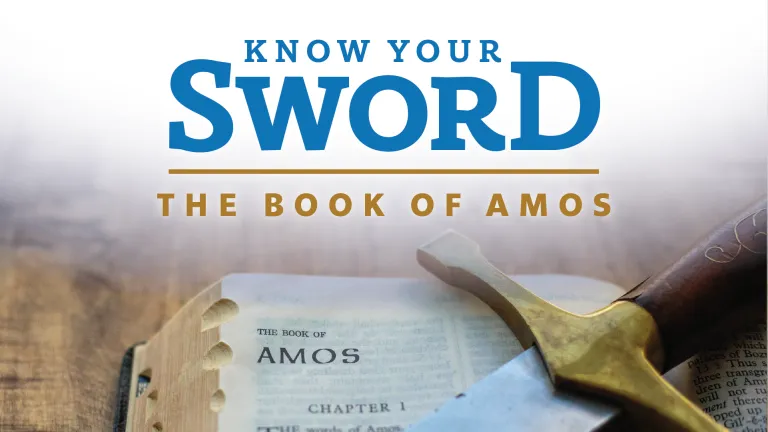Amos Part 07

The final chapter of Amos gives several prophetic end-time insights and reminds Israel that God is all-powerful and deeply wants their repentance, so they do not have to face the negative consequences of their actions.
Amos 9 starts with a vision of the LORD at the altar, showing that this was not a place to escape to. This is not a blessing, but rather God personally pronouncing punishment, similar to Ezekiel 9:6 where punishment begins at God’s sanctuary. The phrase “last of them” doesn’t mean every single individual, but indicates that judgment would come throughout society and across the land, not quitting before finishing the job.
Verses 2–4 emphasize that there is no escape, either high or low. The term “hell” here means in the ground or deep, as opposed to heaven. This imagery is similar to Psalm 139:7–10. Mount Carmel, which rises to 1,800 feet above the Mediterranean and is filled with forests and caves, would still not offer safety. God promises to bring captivity before their enemies, referring to Assyria, though it is not named here. This may be God leaving room to delay punishment if Israel had repented.
Verses 5-6 again introduce and describe God, who has all power, just as in Amos 4:12–13. He is the Creator who builds the heavens in layers, a word that may mean chambers, dwelling places or stairs.
God gives examples of moving peoples, reminding Israel that they are not the only nation He has dealt with (verses 7-8). He will destroy the “sinful kingdom” of Israel as a nation but not exterminate all individual Israelites. Here comes the great, “Yet I,” God's great promise of mercy.
In verse 9, God says He “will sift the house of Israel among all nations . . . yet not the smallest grain will fall.” That couldn’t happen if all the people were killed. This sifting would unfold over centuries and millennia, as the “lost ten tribes” migrated gradually to Northwestern Europe, America and other regions. An end-time fulfillment of this may occur when survivors of the Great Tribulation are drawn back to Palestine (Israel) at the start of the Millennium, in the second Exodus. God has always kept track of who Israelites were and where they are.
Verse 11 begins with “On that day,” a prophetic utterance that almost always indicates that the end-time is being discussed. The phrase “tabernacle of David” (not “house” of David) is also found in Isaiah 16:5. When David brought the Ark to Jerusalem, he placed it in a tent/tabernacle, not on the Temple Mount but on Mount Zion which is also called the City of David (2 Samuel 6:12,17). Later, in 1 Kings 8:1–6, the Ark was moved from Zion to the Temple. Thus, the Tabernacle of David seems to symbolize the Church, which Zion often represents.
This may indicate a dual fulfillment, the “raising ruins of the Tabernacle of David” can refer both to the restoration of Israel in the Kingdom of God with David as king (Jeremiah 30:9), and to the Church being raised up as Spiritual Israel after physical Israel rejected God. In Spiritual Israel, Jesus Christ (descended from David), rules as both King and Priest.
In verse 12, Edom seems out of place and may represent all nations. This could possibly imply that a rival or enemy will be the ruler. Alternatively, it could be a mistranslation of “adam” (Hebrew for mankind), as quoted in Acts 15:16–17, which uses “mankind” instead of “Edom.”
“Behold, the days are Coming" is the start of verse 13 with another prophetic utterance, this time pointing clearly to the Millennium. The phrase “plowman shall overtake the reaper” symbolizes great prosperity and abundance.
Verse 14 promises God will “bring back the captives.” Since Israel never returned from Assyrian captivity, this fulfillment is still yet to come. In order for this prophecy to be fulfilled after Christ’s return, Israel must first go into captivity before Christ returns. This warning does not bode well for the U.S. and Britain (modern Israel).
Finally, in verse 15, God promises to “plant them in their land.” This means Israelites surviving the Great Tribulation will be brought back to the Promised Land in what is referred to as the Second Exodus. There is some speculation about whether “their land” might actually refer to North America, Britain and other lands given to modern-day descendants of Israel. This is uncertain and may be worth considering, but we can’t know for sure before it happens. We can be thankful for the understanding that God has given us and the prophecies contained in these minor prophets.
Minor Prophets class is taught at ABC by Dr. Frank Dunkle.
UYA Team | uya@ucg.org
United Young Adults (UYA) primarily serves the 18–32-year age group for the United Church of God. There are three main areas of contribution to the lives of the young adults: Promoting Spiritual Growth, Developing Meaningful Relationships and Making the Most of Your Talents. The Know Your Sword series is a daily expository message introducing God’s Word from a trusted perspective.

